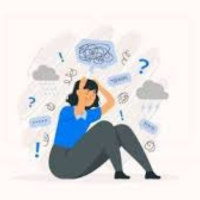Living in a city like New York can be exciting—but it can also be overwhelming. Fast-paced routines, loud environments, and daily stress can take a toll on mental health. For many people, this stress turns into something more serious: anxiety disorder.
Anxiety disorder doesn’t just affect your mind it can cause real symptoms in your body. From muscle tension to stomach issues, the effects are wide-reaching. The good news? You’re not alone, and there are ways to treat anxiety. In this blog, we’ll explore how anxiety disorder affects the body, common signs to watch for, and treatment options including medications like Nexito.
What Is Anxiety Disorder?
Anxiety disorder is more than feeling nervous before a meeting or a test. It’s a condition where worry, fear, and tension interfere with daily life. People with anxiety disorder often feel overwhelmed even when there’s no immediate threat. In New York, where life moves fast, these feelings can easily be triggered.
There are different types of anxiety disorders, including:
-
Generalized Anxiety Disorder (GAD)
-
Panic Disorder
-
Social Anxiety Disorder
-
Phobias
Each one can bring its own symptoms, but many of them affect the body in similar ways.
How Anxiety Disorder Affects the Body
Anxiety starts in the brain, but it doesn’t stay there. Your body reacts to stress by releasing hormones like adrenaline and cortisol. When anxiety becomes chronic, these stress hormones stay active, leading to physical symptoms.
Let’s break down the most common physical effects of anxiety disorder.
1. Muscle Tension and Pain
One of the most common symptoms is tight muscles. You may feel it in your neck, shoulders, or back. Some people even experience jaw clenching or teeth grinding at night.
Why it happens: Anxiety triggers the body’s “fight or flight” response, causing muscles to tense up in preparation for danger—even when there’s no real threat.
2. Stomach and Digestive Issues
New Yorkers often chalk up stomach problems to bad takeout or stress, but anxiety could be the real cause. Symptoms may include:
-
Nausea
-
Bloating
-
Diarrhea
-
Constipation
Why it happens: Anxiety affects the gut-brain connection, often called the “second brain.” When you’re anxious, it changes how your digestive system works.
3. Rapid Heartbeat and Chest Pain
If your heart feels like it’s racing or skipping beats, anxiety might be the reason. In some cases, people think they’re having a heart attack—but it’s actually a panic attack.
Why it happens: Adrenaline speeds up the heart to pump more blood during stress. It’s useful in emergencies but harmful when triggered repeatedly by anxiety.
4. Breathing Problems
Anxiety can cause shortness of breath or a tight chest. You may find it hard to take a deep breath, which can be scary.
Why it happens: Fast breathing or hyperventilation is the body’s way of getting more oxygen during stress—but it can lead to dizziness or lightheadedness if prolonged.
5. Sleep Disruption
Many people with anxiety disorder struggle to sleep. They may lie awake with racing thoughts or wake up frequently during the night.
Why it happens: Anxiety activates the nervous system and prevents your brain from calming down enough to rest.
6. Fatigue and Weakness
Living with constant anxiety can be exhausting. Your body is in a constant state of alert, which drains your energy.
Why it happens: The repeated surge of stress hormones wears down your body, leading to physical and mental fatigue.
7. Immune System Suppression
Chronic anxiety can weaken your immune system, making you more likely to catch colds or infections.
Why it happens: Cortisol, the stress hormone, suppresses immune responses when it stays elevated for too long.
When Should You Seek Help?
If you’re noticing physical symptoms and ongoing worry that won’t go away, it may be time to talk to a doctor. Don’t ignore these signs or assume they’re “just stress.” In New York, it’s common to push through—but ignoring anxiety can make things worse.
Signs you may need help:
-
Physical symptoms with no clear medical cause
-
Trouble sleeping or functioning at work
-
Frequent panic attacks or intense worry
-
Avoiding social situations or daily tasks
How to Treat Anxiety: Options That Help
Anxiety disorder is treatable. You don’t have to live with these symptoms forever. Doctors often recommend a combination of treatments:
1. Lifestyle Changes
Small changes can make a big difference:
-
Daily exercise
-
Limiting caffeine
-
Practicing mindfulness or meditation
-
Regular sleep routine
2. Therapy
Cognitive Behavioral Therapy (CBT) is highly effective for anxiety. It helps you change unhelpful thought patterns and learn coping skills.
3. Medication
In some cases, medication can provide the relief you need to feel like yourself again. One option is Nexito, a commonly prescribed antidepressant used to treat anxiety.
Nexito (Escitalopram) works by balancing serotonin levels in the brain. Many people in New York use it as part of their treatment plan because:
-
It reduces both physical and emotional symptoms
-
It’s generally well-tolerated
-
It can be used long-term under medical supervision
Living in New York with Anxiety: You’re Not Alone
Anxiety doesn’t have to control your life. Whether it’s the subway crowds, job stress, or family demands, New Yorkers face a lot but support is available. Recognizing the physical impact of anxiety disorder is the first step toward feeling better.
Final Thoughts
Anxiety disorder is more than a mental health issue it affects the entire body. From muscle pain to sleep problems, the symptoms are real. But help is out there. With therapy, lifestyle changes, and medications like Nexito, many people find relief and regain control of their lives.


